|
|
|
Sort Order |
|
|
|
Items / Page
|
|
|
|
|
|
|
| Srl | Item |
| 1 |
ID:
122928
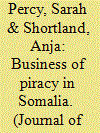

|
|
|
|
|
| Publication |
2013.
|
| Summary/Abstract |
This article argues that understanding why Somali piracy has resisted control efforts requires understanding that it is a criminal business rather than a conventional international security problem. We statistically model Somali piracy and draw two conclusions: first, piracy increases with economic stability, and second, naval interdiction efforts are stabilising but not significantly reducing piracy. We argue that these conclusions are not surprising if piracy is understood as an organised crime. Our argument has four components. First, Somali piracy is a land-based problem, and naval control mechanisms are not deterring pirates. Second, improving Somalia's anarchic political situation will not necessarily stop piracy: our statistical analysis demonstrates that piracy is a business which improves with a more stable operating environment. Third, piracy is organised criminal activity, and like other organised crime groups, will be difficult to control, especially if it becomes embedded in state structures. Finally, we argue that few of the relevant players have any real incentives to alter their behaviour.
|
|
|
|
|
|
|
|
|
|
|
|
|
|
|
|
| 2 |
ID:
150482
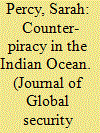

|
|
|
|
|
| Summary/Abstract |
This article examines how a group of loosely connected, often adversarial states have managed to conduct successful counter-piracy operations off the coast of Somalia. The traditional literature on multinational military cooperation assumes that such cooperation will be successful when it is hierarchically organized with a strong central command and unity of action. Counter-piracy has functioned well because it takes a fundamentally different, networked form. Counter-piracy operations are egalitarian, rather than hierarchical, and operate using informal links between militaries. This article considers the implications of informal military cooperation, and the extent to which lessons from counter-piracy can be applied elsewhere.
|
|
|
|
|
|
|
|
|
|
|
|
|
|
|
|
| 3 |
ID:
086350
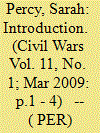

|
|
|
|
|
| Summary/Abstract |
Civil wars are,by their very nature, often characterised by the participation of non-state actors.Because civil wars often occur in situations where the state's authority is weak or non-existent, external actors of all types can play both indirect and direct roles.This special issue seeks to examine these two types of actors combined: What happens when non-state actors external to conflicts paricipate in civil wars?Have new actors of this type appeared on the internationl stage?
|
|
|
|
|
|
|
|
|
|
|
|
|
|
|
|
| 4 |
ID:
145204


|
|
|
|
|
| Summary/Abstract |
There is no disputing the importance of the world’s oceans for global trade, 90% of which relies on maritime routes. However, while maritime trading routes are sources of prosperity and wealth, they are also characterised by high levels of criminal activity. Trafficking in all types of goods, from drugs to weapons to people, relies on maritime transport. Illegal, unauthorised and under-reported (IUU) fishing, or the theft of fishing stocks, poses serious environmental challenges, and IUU fishing vessels are themselves useful tools for smuggling. Piracy preys on shipping and can pose serious challenges to trade.
|
|
|
|
|
|
|
|
|
|
|
|
|
|
|
|
| 5 |
ID:
080178


|
|
|
|
|
| Publication |
Oxford, Oxford University Press, 2007.
|
| Description |
x, 267p.
|
| Standard Number |
9780199214334
|
|
|
|
|
|
|
|
|
|
|
|
Copies: C:1/I:0,R:0,Q:0
Circulation
| Accession# | Call# | Current Location | Status | Policy | Location |
| 053003 | 355.3/PER 053003 | Main | On Shelf | General | |
|
|
|
|
| 6 |
ID:
086359
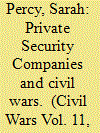

|
|
|
|
|
| Publication |
2009.
|
| Summary/Abstract |
Private security companies (PSCs) have experienced explosive growth since 2001, growth that has been matched only by the consequent explosion in academic attention probing their influence. It is not hard to discover that PSCs and their employees constituted the second-largest member of the US-led Coalition of the Willing during the invasion of Iraq in 2003;1 that this represented a 10-fold increase compared with the first Gulf War in 1991;2 that there are between 15,000 and 50,000 contractors currently operating in Iraq, according to various estimates;3 and that these companies suffer, at the very least, from a dearth of effective regulation4 that some go as far as to call a vacuum.5 However, there has been very little analysis of the consequences of the use of such companies in civil wars. PSCs have the potential, because they are non-state actors, privately motivated, and often external to the conflict, to complicate civil wars. Indeed, the use of PSCs by the US (by far the largest employer of contractors, as PSC employees are often called) has been characterised by a notable absence of planning and policy, both military and governmental. The United Kingdom, which is host to a number of major companies, has similarly failed to examine the policy consequences of the private security industry. This article examines how the absence of effective policy about the effects of privatising force has led to a series of unintended consequences that are influencing and will continue to influence the nature of civil wars. The first section begins by briefly outlining the nature of the private security industry and the roles it plays in civil wars. The second section examines how poor planning has led to problems for the US in its interventions into civil wars, focusing particularly on the private security industry in Iraq. The third section addresses how a similar lack of policy has caused the UK difficulties in the past, and could mean the UK will face problems in conflicts in the future.
|
|
|
|
|
|
|
|
|
|
|
|
|
|
|
|
| 7 |
ID:
076160
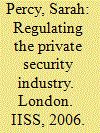

|
|
|
|
|
| Publication |
London, IISS, 2006.
|
| Description |
76p.
|
| Series |
Adelphi Paper 384
|
| Standard Number |
9780415430647
|
|
|
|
|
|
|
|
|
|
|
|
Copies: C:1/I:0,R:1,Q:0
Circulation
| Accession# | Call# | Current Location | Status | Policy | Location |
| 052236 | 344.05289/PER 052236 | Main | On Shelf | Reference books | |
|
|
|
|
| 8 |
ID:
164464
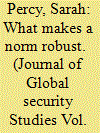

|
|
|
|
|
| Summary/Abstract |
The norm against female combat participation has been powerfully influential and extremely slow to change, despite a record of violation and concerted attempts by states to overturn it. As a result, it is a useful lens through which to examine the factors that make norms robust. I examine two junctures for where the norm has been tested but not overturned: World War II and the slow shift by some states to incorporate women into their militaries beginning in the 1980s. These instances reveal two important elements of norm robustness: (1) the degree to which norms are embedded with other norms is essential to understanding why the norm gained strength after women participated in World War II, and (2) the absence of legalization and norm entrepreneurs explains why the integration of women in the 1980s and onward has not overturned the norm. The article also examines other features of norm robustness, particularly the notion that norms that are both procedural and ethical in character will be more robust, and that the behaviour of powerful states does not always cause norm diffusion through the international system.
|
|
|
|
|
|
|
|
|
|
|
|
|
|
|
|
|
|
|
|
|